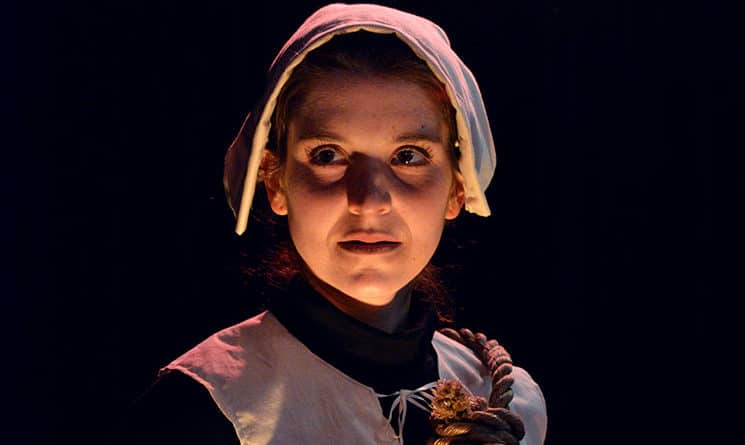When “The Crucible” made its debut on Broadway in 1953, playwright Arthur Miller was clear about the play’s intent. The dramatization of the Salem witch trials was a commentary on a more contemporary set of witch trials — in this case, U.S. Sen. Joseph McCarthy’s highly publicized campaign in the early 1950s to root out what he said were Communist agents who had infiltrated the U.S. government. McCarthy relied on flimsy evidence and inflammatory rhetoric to bolster his charges, tactics that became known as “McCarthyism.”
History has a way of repeating itself, especially when it comes to politics. And so when Genevieve Aichele, artistic director of the New Hampshire Theatre Project, began work on a production of “The Crucible” this winter, she found plenty of modern parallels to McCarthyism and the witch trials.
“It’s just amazing to me how pertinent it still is, the idea that things that are bad can be attributed to one cause, and if we get rid of that one thing, that’ll solve all our problems,” said Aichele, who is directing the show. “There’s so many parallels … whether it’s saying, ‘We should ban all Muslims from entering the country,’ or that we’re going to blame all our problems on gun issues.”
The play opens on Jan. 15 at the West End Studio Theatre in Portsmouth. That this production of “The Crucible” taps into the zeitgeist of a presidential election year is a bonus for Aichele. Her primary reason for staging the play this year was because “The Crucible” offers so many roles for women. It follows “Hot Mama Mahatma,” starring Karen Fitzgerald, and “Eleemosynary,” about the relationship between a grandmother, her daughter, and granddaughter, which were staged earlier in the season.
“This season, I’m featuring plays that highlight women’s roles. Some of them are strong women, some are women in history, and some are plays that have nice parts for women actors. ‘The Crucible’ is one of those — it has a nice mixture of roles,” she said.
According to Aichele, “The Crucible” and the Salem witch trials are especially interesting when viewed through the lens of gender dynamics. Young women “were on the bottom of the ladder, in terms of power” in the 1600s, Aichele said. “Yet somehow, through the process of these witch hunts, they were able to control the most powerful men in government.”
That, in a way, is part of the reason why Aichele wanted to focus on plays with strong roles for women this season. So few of the “great plays” were written by women or feature interesting roles for women, she said. Art helps shape cultural perceptions, and, “If our art doesn’t help move us out of stereotypes, what will?” she said.
In fact, Aichele said she “struggled” with Miller’s story. A love triangle helps drive the drama in “The Crucible,” but, Aichele said, “some of the issues between the women in Salem were so fascinating.”
“It’s so complicated. … I do think we need to look at history through different eyes. So much of history has been looked at through the lens of the patriarchy of white men,” she said. “Artists have a responsibility to lead the way as best we can.”
To help capture the climate of paranoia, fear, and suspicion that Miller creates, Aichele is staging this production in the round, so that the audience is, in a sense, witnessing the Salem witch trials first-hand.
“I wanted the audience to really feel they were part of the story. When you’re sitting in an audience and you’ve got someone in front of you and your pocketbook safely beside you, and you’re in the darkness and the actors are in the light, you can distance yourself from what’s happening,” she said. “Salem was the first time community members actually witnessed the trials … (so I wanted the audience to think about) what that must have been like to see these young girls go into convulsions … and to know that your neighbor might be looking at you, and you might be looking at them.”
The production is also something of a reunion for NHTP actors. NHTP’s youth repertory company is celebrating 19 years, Aichele said, and “The Crucible” features four alumni and three current members of the company. “Part of our mission is to have students working together with professionals and community members as we create art together,” she said. “This play, for me, is the essence of that. It makes me so very proud to have our alumni back.”
New Hampshire Theatre Project’s “The Crucible” is on stage Jan. 15-31 at the West End Studio Theatre, 959 Islington St., Portsmouth, Fridays and Saturdays at 8 p.m. and Sundays at 2 p.m. Tickets are $26. Visit nhtheatreproject.org or call 603-431-6644.

